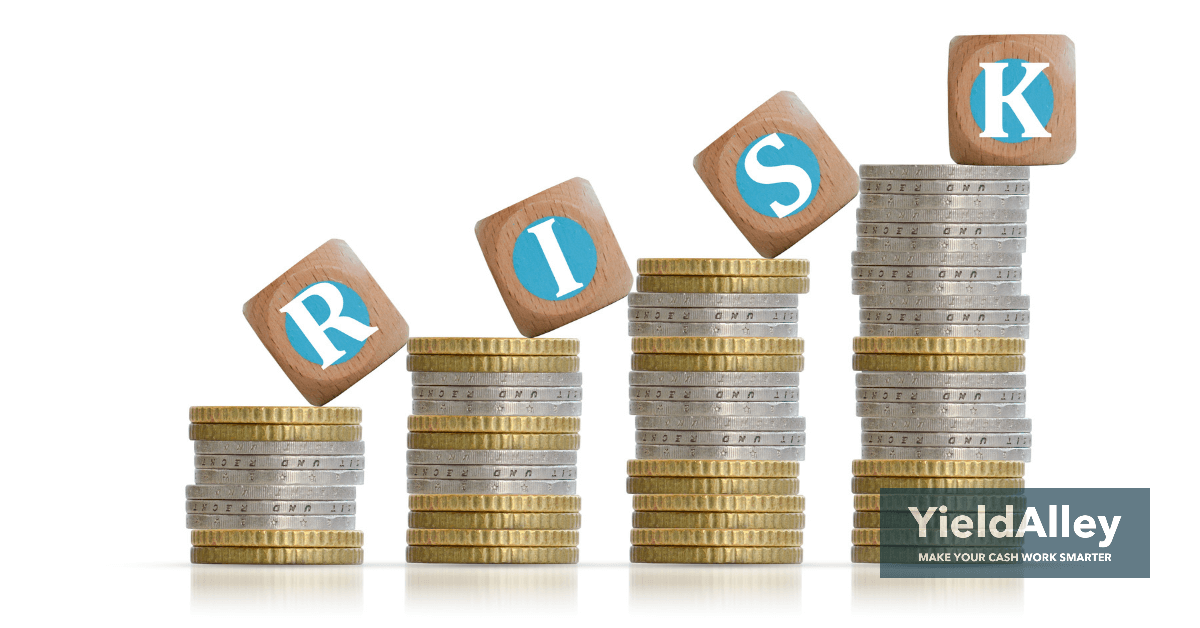Brokered CDs present different risks to traditional bank CDs purchased through a bank or credit union. While brokered CDs can potentially yield higher returns, the risks associated with them are also different, which can be mitigated through due diligence and research.
Risks of Brokered CDs: Are They Safe?
Brokered CDs are bank CDs purchased through a brokerage, and can also be traded on the secondary market before they mature.
Most brokered CDs offered by major brokerages are FDIC-insured. As an investor, you have insurance coverage up to $250,000 per CD per bank in your brokerage account. For example, in a single Merrill Edge brokerage account, you could buy multiple CDs from different banks. You could buy a brokered CD from JP Morgan Chase for $100,000 and another brokered CD for $200,000 from Goldman Sachs. In total, you would have total FDIC coverage of $300,000.
Compare this to your Bank of America account, where you buy a bank CD. You will only have coverage up to $250,000, with no expanded FDIC insurance.
As long as your brokered CD is FDIC-insured (meaning that the bank that issues the CD is titled with the FDIC) and you hold your brokered CD to maturity, there is extremely little risk.
You should pay attention to a few things when buying a brokered CD.
- If your brokered CD is not FDIC-insured, beware of unreputable banks and brokers issuing the CD.
- Is your brokered CD callable? While most brokered CDs are call-protected, some are not. This means the issuing bank may redeem it and call back the CD. We will go into more detail below.
- Complexity. Brokered CDs may be an additional hassle for investors who want a simple CD, without needing to research whether it’s additionally FDIC insured or callable. In the event of an issuing bank going bankrupt, this may create additional hassles for investors to get their principal back, even if FDIC insured.)
Be Aware of Suspiciously High CD Rates
Suspiciously high CD rates can be a red flag for potential scams or non-reputable brokers. Unscrupulous brokers may use high CD rates to attract customers and then market them to other investments that offer big commissions. In some cases, the high CD rates can be very misleading. For example, a high-rate brokered CD might be issued by a foreign bank and therefore not protected by FDIC deposit insurance. This is the primary risk of brokered CDs but is usually heavily mitigated if you purchase your brokered CD through a reputable brokerage such as Fidelity, E-Trade, or Charles Schwab.
Is Your Brokered CD Callable?
Always double-check if your brokered CD is callable. Most brokered CDs are call-protected, which means the CD cannot be called back. In an environment with declining interest rates, the issuing bank may decide to call back the brokered CD to take advantage of the lower interest rate environment.
Brokered CDs Can Be More Complex
While more terms and options offer a greater deal of variety to fit a customer’s needs, brokered may overwhelm an investor who is looking for a simple fixed-interest yield from their current bank. Brokered CDs require investors to understand callable features, any secondary purchase fees, and to confirm that the bank issuing the CD is FDIC-insured.
We believe the diligence around brokered CDs is highly worth it. Brokered CDs offer rates that far outweigh bank CD rates. If you are even remotely interested in earning higher CD rates, you should investigate brokered CDs.
Brokered CDs Have Less Liquidity
Brokered CDs can sometimes pose a liquidity risk, meaning there is a high chance of receiving an unfavorable price when selling them on the secondary market. The market for reselling CDs can be limited, with low bidding activity, and typically requires a minimum face amount of $10,000. If you wish to sell an amount lower than that, you would need to request a custom bid through the brokerage.
Summary of the Risks of Brokered CDs
Brokered CDs can offer higher returns and provide a variety of options for any investment portfolio, but they come with a higher level of risk and require a deeper understanding compared to traditional CDs. It’s essential for investors to understand the risks of brokered CDs and to do their due diligence before investing in brokered CDs.






